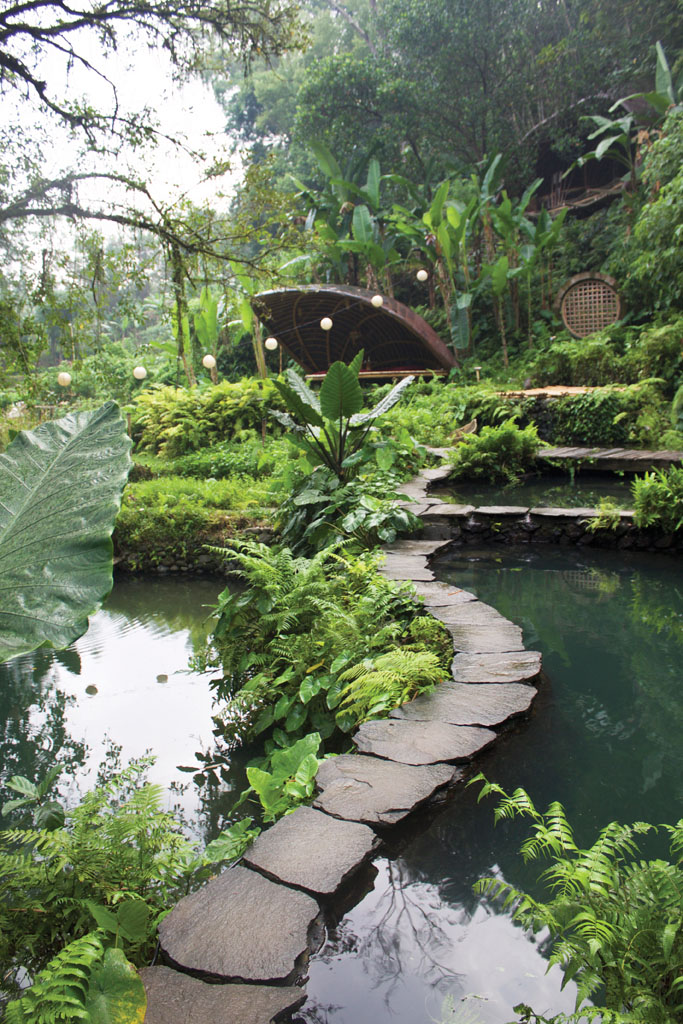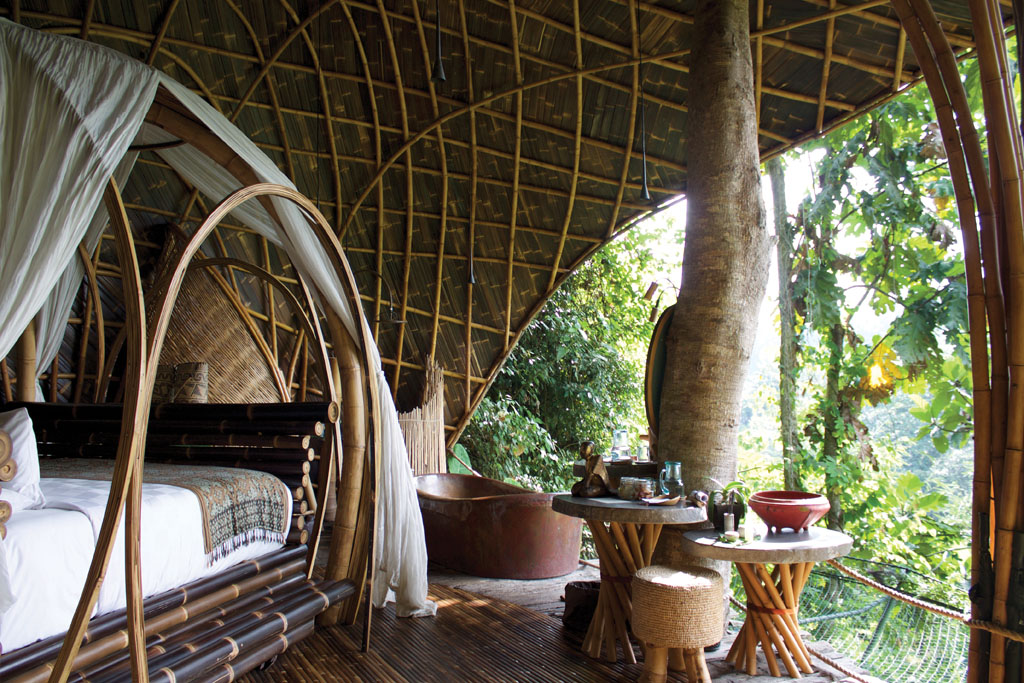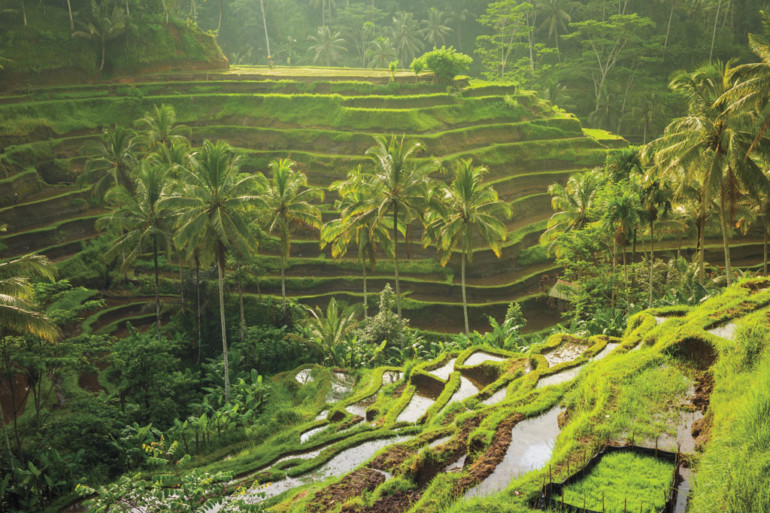Before leaving for Bali, I sat down with my uncles Dave and Joe. My mother’s brothers pulled out a photo album, the two of them together on the Indonesian island at 29 (the same age I am now), their frizzed wavy hair worn to shoulders, smiling from the porches of small wooden huts encased on all sides in a deluge of lush greenery. “Paradise,” they said. Though, after that visit in the 1970s, Joe vowed never to return. “The modern tourism was starting in earnest, and I could see how it was going to go,” he said. And while the Eden I found was one of the most surreally beautiful places I’ve encountered, the footprints of the Western world have left an equally immense impression — on both me and the island itself.
IT’S MIDNIGHT AT Denpasar Airport, and I’m both jaded and exhausted. Unanticipated realities at home have left me in no mood for any sort of utopia — I want a dark room and junk food — but here I am, alone, after 30 hours of travel. To find myself, or something. To say that being in Bali feels like a chore is an absurdity and an obnoxious show of privilege. But at the moment, it does.
One harried negotiation in a mosh pit of eager drivers and I’m watching a cacophony of bottom-lit sculptures, billboards, and plant life flit through the frame of my open window. The streets are remarkably clean, the traffic that skids around the city organized. My taxi driver asks what I do.
“I’m a writer,” I say.
“Elizabeth Gilbert!” he says cheerfully.
This is not the last time that I will hear about the Eat Pray Love author. That woman is a beacon of tourist dollars around here.
BALI IS THE SORT of anomaly that myths are made of. While the Balinese were initially joined by a diverse group, including Chinese settlers and a share of Javanese, the 15th century and an infusion of Islam throughout nearby Java forced the last Javanese Majapahit king — along with a slew of priests, aristocrats, and intellectuals — to the volcanic and easterly adjacent island of Bali. They erected temples, danced, and continued to cultivate a culture whose every aspect revolved around their chosen religion: Hinduism. Today, Bali has the largest Hindu population in Indonesia and is surrounded by Muslim neighbors.
MY SHUTTLE IS bound for Ubud, a jungled hub in the uplands of the Gianyar region known for its culture, surface-level spirituality and tiered rice terraces. It is in those terraces — waterlogged steps carved into the hillsides of the Tegallalang district — that I plan to make my home, in a little hut I sleuthed out on Airbnb. A drop-off in a graveled parking lot, a path flanked in intermittent light, a descent down dirt steps, a bamboo gate. Below spangled obsidian skies, soft lights from a neighboring restaurant insist that my house is positioned in the middle of a postcard. The resounding (and, initially, extremely disconcerting) call of a gecko (“GECK-OH! GECK-OH!”) rises raucously above the smooth symphony of jungle bugs, and soon the song transforms into a new kind of silence. My bed is bordered by an ethereal draping of mosquito nets. I can’t complain.
Jet lag has me up with dawn’s first light, and I choose to take advantage. I walk out of my front gate and into the terraces, heel-toeing my way across the thin, snaking rims of ponds brimming with rice stalks as carefully as one would walk a balance beam. A snail with a shell that looks like it belongs on a beach inches in front of me. I step over it and into a camouflaged drainage gap, submerging my slipper in the muddy spring waters. But the combination of burgeoning birdsong and hazy morning light is intoxicating, so I squelch on.
Treasures present themselves in the form of sounds (a wooden water pump striking the side of a bucket rhythmically, a natural backbeat) and daily offerings, three-inch-by-three-inch trays of plaited palm leaves, containing such representative trinkets as frangipani, grains of rice, crackers and marigold petals, finished with incense. The diminutive gifts are everywhere: on the street, in front of every home (homes that each contain at least one family temple, ample evidence of the importance of worship in this society), piled atop wooden boxes placed throughout the terraces. When I return to my house, there’s one on my doorstep. The ritual is how Balinese women begin the day, washing the streets and gutters in front of their homes (likely one of the reasons Bali is so clean) before presenting their creations. The squares are often replaced in the afternoon for a refresh of reverence for Sang Hyang Widhi Wasa — the “All-in-One God.”

The swimming ponds of Bambu Indah.
MY CONTACT WHILE at the cottage is Wayan Lendy. The addition of “Lendy” is all that verbally differentiates this Wayan from numerous others. With a four-tiered caste system, Bali is nothing if not organized, and members of his caste, the lowest caste — farmers and laborers, who make up 90 percent of the population — are generally given one of four names, whether male or female. Wayan is reserved for the firstborn. Or the fifth-born, when the cycle begins anew. He asks that I call him Lendy.
Lendy hands me a helmet and I hop on his motorbike, pretending (very convincingly, I believe) that I am not scared. I have heard tales of death by motorbike, of first-day stitches, of head injuries. But after a mere 30 seconds, anxiety gives way to bliss, and soon I am convinced that the back of a bike is the best seat there is. We skim fluidly through tiny villages, past uniformed children heading to school, Frozen backpacks in tow, past women with baskets of tropical fruit balanced on their heads, women scouring sidewalks, women making offerings. Men huddled in discussion. Rice paddies turn to thick jungles and back again. I’m grinning like an idiot, and when Lendy drops me in Ubud’s city center — after navigating the impressive amount of gridlock that appeared as if from nowhere upon our approach — I dismount a much happier camper.
This will be a daily occurrence over a long string of days, Lendy delivering me from quietude to some of Bali’s busiest streets. He tells me that there’s a bike I can rent, but I’m not that brave.
AND SO I LEARN to live like a Westerner in Ubud. This is not a hard thing to do. The charming lanes are laden with tourists and expats, along with vegan restaurants (which I patronize), clothing stores (which I peruse), yoga studios (which I frequent) and locals handing out fliers for another “traditional dance performance” at another temple (I attend two). I ditch the full-frontal sun and watch from the shade as the monkeys scamper around the Ubud Monkey Forest. A bleached blonde girl with a shirt that says “Spiritual Gangster” walks by, and I am forced to pause for several moments to contemplate that garish contradiction in terms.
I make friends. In fact, every opportunity for alone time is thwarted almost comically (karmically?) by affable interlopers. There’s Molly from Brooklyn, with whom I bond during a Yin yoga class at The Yoga Barn — a sanctuary of feels-just-like-California spirituality that makes for a nice escape from the crammed and crumbling sidewalks — when we are unable to position the provided tennis balls at the correct pressure points beneath our backs, taking turns at quiet exclamations of agony. Afterwards, we get wine down the road and befriend a visiting didgeridoo player. Then there’s Jasmina from Berlin, who actually shouts “Are you here alone? Want to hang out?” at me as I’m exiting an alleyway and waits patiently as I explore the Pura Puseh temple, which she can’t enter due to her tank top. That night we go to a resplendent restaurant called Bridges, where we are the only two not enjoying a romantic evening. We both order the tasting menu and share stories of home, and I decide that sometimes — particularly on this trip — solitude is not what’s necessary for growth.
I visit Villa Kitty, a foundation created to house and rehabilitate stray cats and kittens. It’s incredibly well-managed, but inundated — there are 180 cats on the day of my visit. I cradle a tiny specimen named Timmy in my palms as I chat with Steve, a man from New York who wanted similar solace after encountering so many stray animals throughout the island. Another friend.

The Copper House at Bambu Indah.
AFTER SEVERAL excessively humid days filled with frizzy hair, obscenely affordable spa visits — a massage at Nur Salon is followed by a soak in a tub brimming with flower petals — one Community Heart Talk (the subject is patience and makes me consider extending my trip to just be) and one particularly irksome Sound Meditation (perhaps the least relaxed I’ve ever been), I’m ready for a slightly grittier dose of actual Balinese culture. The point is driven home one afternoon as, while exiting The Yoga Barn, I witness a group of eight Balinese employees observing an Ecstatic Dance class from the reception desk. Westerners bop around the vaulted studio to the tune of a clubby bass line. The Balinese stare blankly. I stand with them, silently, for a minute or two, trying to catch a glimpse from their vantage.
It’s worth noting that while yoga is a Hindu practice, it’s an Indian one, which here in Ubud seems reserved solely for visitors. Taxi drivers ask if I’m here to do yoga in a quietly mocking tone. “Some people come and just do yoga, every single day!” one says, laughing at the ridiculousness of the ritual. This, from a community to whom ritual is a way of life.
And so, when Lendy offers to take me across the terraces and into his village, I immediately accept the invitation. Molly in tow, we navigate the soggy levels, our guide offering up details about rice cultivation along the way. Bananas swing, Seussian, overhead. We pass temples, small cemeteries. Molly laments in hushed tones as malnourished dogs circle our feet. We enter the home of Lendy’s friend to find him seated at the center of the compound, carving a wing out of wood. His father meanders around and roosters thrash around in inverted basket cages, eager to come out swinging. It’s uncomfortable simply because it’s different. It’s what I’ve been looking for.
MY LAST NIGHT in town is set to be a lavish one and one where I will finally be utterly alone. I’ve booked a room at Bambu Indah, an “eco-resort” built sustainably and almost entirely of teak and bamboo (a bamboo elevator will take me to my space) by longtime expats John and Cynthia Hardy. There’s a vegetable garden that transmutes into meals and a natural swimming pond. My room — the Copper House, a new structure divined by John and his daughter Elora — is an open shell in the trees that overlooks the Ayung River. I’m going to journal and be still and not talk to a single soul.
But when I arrive, there’s a celebration in my backyard. My open home, the most isolated in the bunch, is like a luxurious command tower seated above one of the resort’s recently implemented Sunday spring-water pool parties. And it is, of course, Sunday. I laugh out loud at the best-laid plans and make my way down.
I meet a scientist who’s writing a book on electromagnetic fields and who has been ricocheting between the Bay Area, Ubud and Chiang Mai for the past decade. I dip my feet in the water as he tells me tales of local cult activity — hint: there’s a fair amount, and it’s predominantly Western-driven — as a group of Australians host a tea ceremony on a neighboring rock platform. Steve, from Villa Kitty, is suddenly there, at the bar with two friends who are in Ubud “sitting with a guru,” who upon further inquiry turns out to be a 65-year-old German man hosting a cadre of women along with a few young men with bright eyes and deep pockets. The Ayung River flows dreamlike around arrangements of lanterns. Later, there’s fire and dancing.
I retreat to my room to jot one thing down.
“IF I REALLY WANT to grow, I’ve got to go home,” I scrawl in childish handwriting before rejoining the festivities.
I can see why so many flock to Ubud looking for something — it’s a visual paradise, with a rich history of cultural openness and spirituality. But if everyone slips away to the same place, what results is a party of lost souls, most beautiful, all vulnerable, and all escaping. I don’t know that I will take the same path as my uncle and give up on the island entirely. But if and when I do return to Eden, it will be with the knowledge that the fruit of that place was tasted a long time ago.


